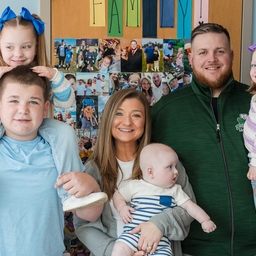Cell & Gene Therapy News

Gene therapy may slow loss of motor function in ALS, Penn and CHOP research finds
CHOP and Penn researchers have developed a gene therapy that significantly slowed motor function loss in preclinical models of amyotrophic lateral sclerosis (ALS), offering new hope for treating the devastating neurodegenerative disease.
Children’s Hospital of Philadelphia Researchers Develop Promising Tools to Enhance Gene Therapy Delivery for Hard-to-Treat Diseases
Researchers at CHOP established a transformative advance in gene therapy, demonstrating how new generations of AAV vectors can target relevant brain cells and structures at much lower doses than current AAV based drugs.

World's First Patient Treated with Personalized CRISPR Gene Editing Therapy at Children’s Hospital of Philadelphia
Landmark study from CHOP and Penn Medicine showcases the power of customized gene editing therapy to treat patient with rare metabolic disease.

Children’s Hospital of Philadelphia’s First FDA Approved Gene Therapy Patient for Severe Beta Thalassemia Celebrates Two Year Treatment Anniversary
Patient no longer needs regular blood transfusions for her inherited blood disorder, and her future has been transformed.
Children’s Hospital of Philadelphia Preclinical Study Demonstrates Improved Gene Therapy Approach to Treating Metachromatic Leukodystrophy
In a preclinical study, researchers at Children’s Hospital of Philadelphia (CHOP) demonstrated a novel gene therapy with potentially increased effectiveness and safety for the treatment for metachromatic leukodystrophy (MLD), a rare disease in young children characterized by the deficient activity of a critical enzyme. Without effective treatment, MLD leads to rapidly declining neurological skills in young children and is potentially fatal. The promising findings were published in the journal Molecular Therapy Nucleic Acids.
Children’s Hospital of Philadelphia Preclinical Study Unveils Promising New Treatment Approach for Fanconi Anemia Patients
In a preclinical study, researchers at Children’s Hospital of Philadelphia (CHOP) demonstrated a novel treatment strategy for patients with Fanconi anemia (FA), a rare genetic disease resulting in loss of blood-forming stem cells in the bone marrow. The researchers successfully used in situ mRNA delivered directly into the body by lipid nanoparticles (LNPs) to target bone marrow cells and transiently restore stem cell function in patients with FA.
First of Its Kind Gene Therapy Model Offers Hope for X-Linked Sideroblastic Anemia Treatment
Researchers at Children’s Hospital of Philadelphia (CHOP) and the University of Pennsylvania Perelman School of Medicine pioneered a first of its kind gene therapy model that offers a potential breakthrough in treating X-linked sideroblastic anemia (XLSA), a rare congenital anemia caused by mutations in the ALAS2 gene crucial for the synthesis of heme, a key compound in hemoglobin. This study marks the first time researchers studied gene therapy to treat this disease, which the authors underscore could have an impact on a broad spectrum of diseases. The research was published today and featured on the cover of the journal Blood.

Children’s Hospital of Philadelphia Researchers Announce Promising Results from First-of-its-Kind, Multicenter, Phase 1 Gene Therapy Trial for Danon Disease
Researchers at Children’s Hospital of Philadelphia (CHOP) announced encouraging results from the first ever gene therapy trial for Danon disease (DD), a rare, X-linked heart condition caused by a single gene mutation. The data on the results of the RP-A501 Phase 1 trial, presented at a late breaking session today at the American Heart Association Scientific Sessions 2024 in Chicago, were also published in the New England Journal of Medicine.
Children’s Hospital of Philadelphia Launches Global Partnership to Establish a CAR-T Therapy Program in Brazil
Made possible with a $4 million grant from the Brazilian Ministry of Health, CHOP cell therapy specialists will offer their expertise and resources to oversee this initiative.
Researchers at Children’s Hospital of Philadelphia Reveal New Insights into Non-Inflammatory Causes of Rare Neurological Symptoms in Children, Adolescents and Young Adults Following CAR-T Therapy
Researchers at Children’s Hospital of Philadelphia (CHOP) revealed for the first time that children, adolescents and young adults may experience very rare neurological issues of paraparesis and quadriparesis following chimeric antigen receptor T-cell (CAR-T) therapy, a type of immunotherapy used to treat B-cell Acute Lymphoblastic Leukemia (B-ALL). Additionally, these complications occurred without the type of inflammation typically seen in adults. The findings were published today in the journal Blood.